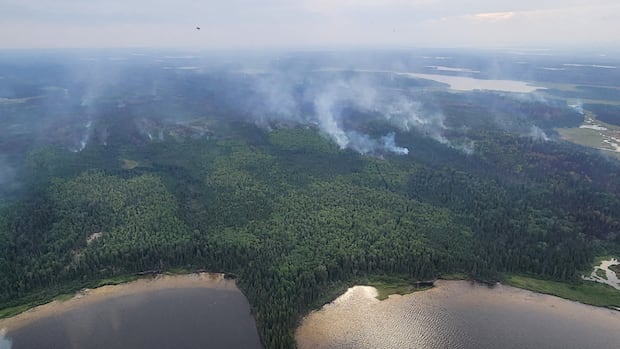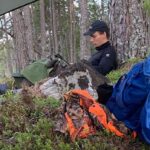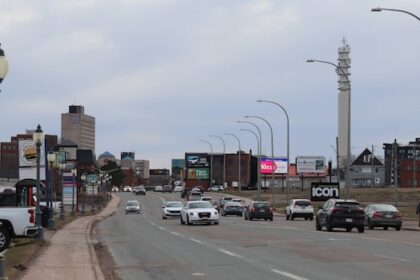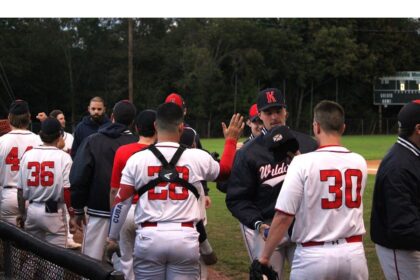Manitoba’s provincewide state of emergency ended Friday, nearly three months after officials first declared it amid the worst wildfire season in three decades. The first state of emergency this wildfire season was declared on May 28. It was lifted on June 23 as conditions were improving. The province declared another state of emergency on July 10, which was extended until Aug. 22 earlier this month. The latest fire bulletin from the province, released Thursday, said the fire danger in the majority of the province is now considered low and the status of five significant fires has been downgraded from out of control.The Manitoba Wildfire Service continues to respond to 149 active fires across the province, with a total of 417 wildfires to date, well above the average of 338 fires for this time of year, the bulletin said.And as of 9:30 a.m. Friday, there were still 7,050 people out of their home communities due to wildfires, a provincial spokesperson said.The province said current evacuation orders will remain in place until they’re removed by local authorities.And some evacuees have been given the green light to return home.’Wonderful’ to go home, says Snow Lake mayorAbout 1,000 evacuees from Snow Lake will return to their community, about 700 kilometres northwest of Winnipeg, on Friday. Mayor Ron Scott said the air is clear and it’s “wonderful” to be back.”There’s no fire impinging on the town right now. And of course, it’s been absolutely wonderful to see all this rain that we’ve had in the last few days,” he told CBC Manitoba Information Radio host Marcy Markusa.”We had a major thunderstorm go through the other night, and fortunately, none of the lightning strikes started another fire. Certainly all this rain is going to help out immensely.”A rainfall warning issued Thursday by Environment Canada remains in place for a band of northern Manitoba hit hard by the fires this year.The warning area includes Leaf Rapids, Lynn Lake, Gillam, Pukatawagan, Split Lake, Thompson, Shamattawa and Nelson House. Snow Lake was included in Thursday’s warning, but Environment Canada is still forecasting rain for the town on Friday and a chance of showers on Saturday morning.Snow Lake has had two evacuations this summer. The first was in early June as a major blaze that threatened Flin Flon, Sherridon and Pukatawagan pushed toward the town. It was brief, though, as favourable weather changed things for the better. “Then we got hit with a number of lightning strikes that started [a new fire] just to the north of Reed Lake, and that fire quickly ramped up to the north and then came at us,” Scott said. That fire “almost completely surrounded us. Only the south was still open.”That forced the second evacuation in early July, which is now just ending. The mandatory evacuation order was lifted at 8 a.m.”It’s been extremely trying for everybody,” Scott said.The air in Snow Lake was shrouded in wildfire smoke on June 1. (Submitted by Ron Scott)A welcome centre has been set up inside the town’s community hall, with representatives from Manitoba Health to help people with both physical and mental health needs, he said.”And we’ve also opened up a food bank based on some very generous donations from one of our businesses in town,” he said.”That will help residents out who aren’t able to bring groceries back with them or may be extremely financially strapped right now. That will help get them started.”Representatives from Red Cross will be on hand to help returnees, as well as Service Canada to deal with any employment insurance issues people might have.”And all of our essential services are open as of today — post office, bank, pharmacy,” Scott said. “The grocery store will be getting a large order in today, so we should have everything up and running and available for people certainly this afternoon.”Despite the return to normal, there are still hot spots burning.”It’ll still be another couple of weeks by the time they can say that this fire is fully dead,” Scott said.”Even with the rain we’ve had, [Manitoba Wildfire Service] said a lot of the fire has just gone into the what they call the duff, the organic matter, and just sits there and smolders. So they want to hit all of it and make sure it’s just done.”While the crews remain around the community, Scott has one wish.”I just hope all the residents take the time to thank a firefighter, because they’re the ones … that stopped the fire right on the edge of town, and that people appreciate the fact that they do have a home and a business to come back to.”Other changes Friday include the reopening of Wekusko Fall Provincial Park to seasonal campers.Nightly campsites will remain closed for the season, though. And the Manitoba Wildfire Service has resumed issuing burning permits.No firm return date for Pukatawagan evacueesPukatawagan Coun. Alma Hart said Friday the northern First Nation is preparing to welcome community members home, nearly three months after residents were forced out by an out-of-control wildfire. Hart said Chief Gordie Bear announced at an Assembly of Manitoba Chiefs meeting earlier this week that Pukatawagan — also known as Mathias Colomb Cree Nation — will begin repatriating most residents when the local store and gas station have been restocked with supplies. The First Nation, located about 700 kilometres northwest of Winnipeg, issued an evacuation order on May 28. Since then, residents have been displaced across provincial lines — from Brandon and The Pas to Niagara Falls, Ont. While there is no firm return date yet, Hart said community members without health conditions will start heading home soon. But priority-one evacuees and the community’s most vulnerable will have to wait a little longer.”Right now, [Bear] wants to make that bold decision to get the ones that can go home, home, to start looking after their backyards, their homes, to look after their dogs, to get the community ready for the other ones to come home,” she said. Hart said residents will have to rely on generators while power is still out in Pukatawagan. Manitoba Hydro’s website shows service won’t be restored there until the week of Sept. 28.She said Pukatawagan plans to acquire a large generator to act as a backup system for the community. “A lot of people are getting homesick and lonely and stressed out,” she said. “They want to see their kids go to school, they want to be back home, looking after their property.”Ervin Bighetty (right) and his fiancée Precious Teli are getting ready to head back to Leaf Rapids. (Josh Crabb/CBC)Preparations underway in Leaf RapidsErvin Bighetty, general manager of the Co-op grocery store in Leaf Rapids, Man., said preparations are taking shape in anticipation of evacuees heading back there soon, too.Bighetty said he was recently contacted by the town administrator to get supplies to restock the store.Speaking outside a hotel near Winnipeg’s airport, where he and his family have been staying since Leaf Rapids was evacuated on July 7, Bighetty said he’s hoping to go home on Sunday or Monday.Before the mandatory evacuation order can be lifted, power needs to be restored so that essential services — the store and health centre — can function, Bighetty said.Manitoba Hydro’s website says work to restore power in Leaf Rapids should be done by the week of Sept. 7.There are two fires in the area of Leaf Rapids, about 750 kilometres from Winnipeg, but both are now listed by the province as being held.”I feel happy that we’re going to get things back … [and] I’m excited that I get to go home. It’s been a long time,” Bighetty said.He’s concerned, though, that some returnees might come back with additional baggage. He witnessed changes in some people who began using alcohol and other substances as they struggled in the city.”It’s sad because I see it everywhere. I see they’ve gotten into bad habits that they didn’t have before. Now they’ll take that home and it’ll affect them and their life and their family,” he said.”When people go home, there’s going to be a lot of addiction talk and family talks.”Cool, wet weather a relief for Manitoba wildfire evacueesRecent rain and cooler temperatures are bringing relief to Manitoba’s wildfire zones. That’s giving hope to evacuees still waiting to go home.
Friday, 6 Feb 2026
Canada – The Illusion
Search
Have an existing account?
Sign In
© 2022 Foxiz News Network. Ruby Design Company. All Rights Reserved.
You May also Like
- More News:
- history
- Standing Bear Network
- John Gonzalez
- ᐊᔭᐦᑊ ayahp — It happened
- Creation
- Beneath the Water
- Olympic gold medal
- Jim Thorpe
- type O blood
- the bringer of life
- Raven
- Wás’agi
- NoiseCat
- 'Sugarcane'
- The rivers still sing
- ᑲᓂᐸᐏᐟ ᒪᐢᑿ
- ᐅᑳᐤ okâw — We remember
- ᐊᓂᓈᐯᐃᐧᐣ aninâpêwin — Truth
- This is what it means to be human.
- Nokoma











